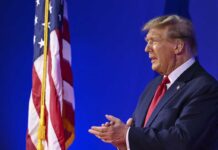
A landmark new U.S. Senate bill—the GENIUS Act—is poised to reshape stablecoin regulation by enabling corporations and financial giants to issue digital dollars, escalating tech’s influence over money and raising fresh concerns of conflict-of-interest.
At a Glance
- The Senate is advancing the GENIUS Act to establish a federal framework for U.S.-dollar–pegged stablecoins
- Major banks including Bank of America, Morgan Stanley, Société Générale, and Banco Santander are running pilot programs or planning stablecoin issuance
- Retail giants Walmart and Amazon are exploring proprietary tokens or consortium coins pending regulatory clarity
- Legacy issuers such as Tether (USDT), Circle (USDC), Paxos (USDP), and PayPal together control nearly $247 billion in market cap
- Critics worry the bill doesn’t bar the president or family from issuing coins, potentially benefiting Trump’s USD1 token
Corporate Crypto Explosion Meets Congressional Guardrails
As the Senate prepares to vote on the GENIUS Act, financial giants are positioning for the token era. Bank of America and Morgan Stanley are piloting stablecoin programs, while European banks like Société Générale and Banco Santander plan issuance once regulations clear. Retail players including Walmart and Amazon are considering stablecoins for supply chain and retail systems but await legal certainty.
The act would legalize fully backed stablecoins, require routine audits, enforce liquidity rules, and mandate compliance with anti-money laundering laws. Current leaders like Tether, Circle, Paxos, and PayPal account for nearly $247 billion in global circulation, and the bill aims to standardize oversight for such issuers in the U.S.
Ethical Loopholes and Power Plays
The bill—short for “Guiding and Establishing National Innovation for U.S. Stablecoins”—has bipartisan Senate support. But critics are seizing on a glaring omission: it does not prohibit sitting presidents or their immediate families from issuing or benefiting from stablecoins. That provision could shield ventures like Trump’s USD1 coin, raising alarm from lawmakers like Senator Elizabeth Warren.
Watch a report: Senate Advances GENIUS Stablecoin Bill.
House Republicans, meanwhile, are pushing to merge GENIUS with broader crypto legislation like the Clarity Act. The House Financial Services Committee could demand amendments that delay the rollout until late 2025 or beyond.
Global Takeoff, U.S. Dollar Reinforced
The stablecoin sector is already embedded in global finance, powering cross-border trade, treasury operations, and decentralized finance protocols. According to Barron’s, analysts project market volume will exceed $2 trillion by 2030 if clear U.S. regulation is established. Proponents argue GENIUS could lock in U.S. dollar supremacy abroad and attract both domestic and foreign fintech innovation.
Still, with billions in private issuance at stake and limited restrictions on executive entanglements, the bill’s passage could ignite a new monetary arms race—one where banks, tech firms, and political families compete to mint the next generation of digital dollars.





























